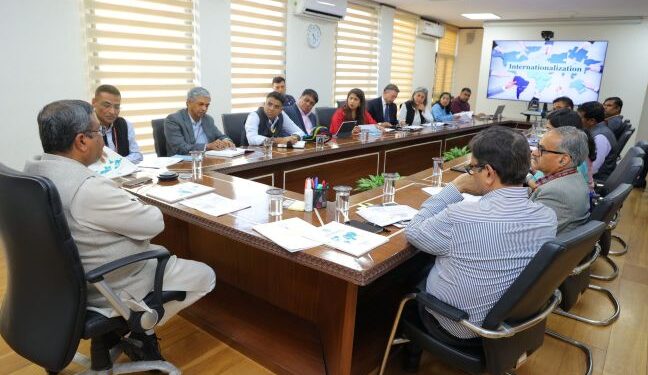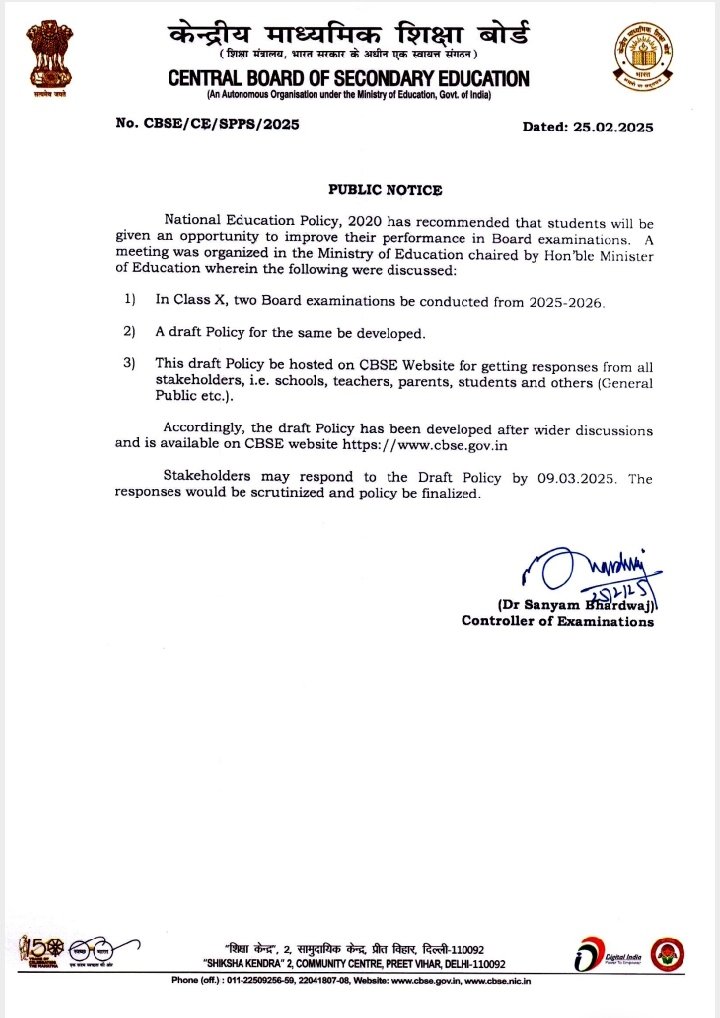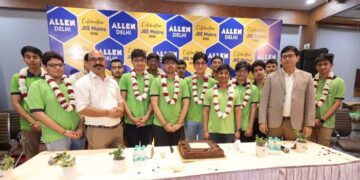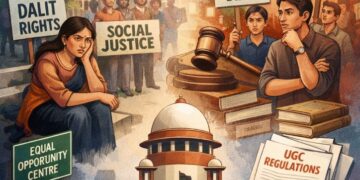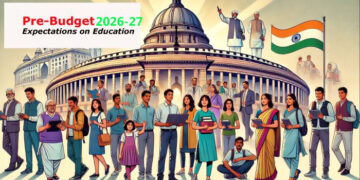By Autar Nehru
The Central Board of Secondary Education (CBSE), India’s national school examination board under the Ministry of Education, having 30, 700 affiliated schools, on Feb 25 through a public notice announced that starting from 2026, class X board exams will be held twice a year. To facilitate stakeholder participation, the board has also released a nine-page draft policy, inviting feedback until March 9, 2025.
Genesis of the Two-Exam Model
The prompt for this reform comes from the National Education Policy (NEP) 2020 and the National Curriculum Framework for School Education (NCF-SE) that recommends of conducting two board exams annually for classes X and XII stems from NEP 2020, which proposes reducing the high-stakes nature of exams by allowing students a second attempt to improve their scores. Paragraph 4.37 of the NCF-SE states, “To further eliminate the ‘high stakes’ aspect of Board Exams, all students will be allowed to take Board Exams on up to two occasions during any given school year, one main examination and one for improvement, if desired.”
Following this directive, the Ministry of Education tasked CBSE with creating an implementation roadmap. However, an initial consultation process in April 2024 indicated that conducting two board exams under the current system would be highly challenging. The board cited logistical issues, highlighting that exams require over 150 procedural steps and take approximately 310 days from registration to result declaration, with a 55-day exam schedule and additional time for evaluation.
The CBSE Draft Policy
Despite logistical concerns, the Ministry of Education remained keen on implementing the two-exam model. In February 2025, CBSE decided to introduce the system first for class X, considering it a lower-stakes examination compared to class XII. As such a draft policy was uploaded on CBSE website for stakeholders’ feedback and suggestions.
Under the new proposed scheme, the schedule of the two examinations will commence on Feb 17, 2026 with the first phase till March 6 and conclude on May 20 with the second phase that will start on May 5. Overall, the total examinations period including results and verification will be four months. Around 26,60,000 students are expected to write these exams and there will be an estimated 1,72,90,000 answer books to be evaluated.
As per the draft, the registration for the taking exams will take place by September and filling of LOC for the first examination will be compulsory for all those appearing in the first exam as well as wishing to sit in the improvement exam subsequently. Examination fee will be enhanced and collected for both examinations at the time of filling of LOC for the first time which would be non-refundable if once paid. Students can reattempt one or more subjects for score improvement.
Sports students must appear in one of the two board exams; no separate exams will be conducted for them. Those failing in one to five subjects in the first exam will be placed in the “Improvement Category” and allowed a second attempt. The second exam will also serve as a supplementary exam, eliminating the need for additional re-examinations. Exam fees will be collected at the time of initial registration and will be non-refundable.
Concerns from Educators and Schools
While the policy appears viable on paper, educators and school administrators have expressed significant concerns over its feasibility and potential impact on academics.
Infrastructure and Resource Limitations: Suresh Chander, president of the Haryana Progressive School Conference (HPSC) and founder of Grand Columbus International School, Faridabad, highlights that many schools lack the infrastructure to serve as exam centers for extended periods. “While some schools have adequate infrastructure, most have just enough for their regular needs. Hosting exams for nearly two months and engaging teachers for evaluation is a major concern,” he states.
Academic Disruptions: Dr. Sudha Acharya, principal of ITL Public School, Dwarka, and former chairperson of the National Progressive Schools’ Conference (NPSC), warns that the prolonged examination schedule will significantly reduce academic days. “The Right to Education (RTE) Act mandates 210 school days annually, but with school closures due to vacations, pollution, and extreme weather, the number of actual teaching days may shrink to just 100.”
Increased Pressure on Students: While the policy aims to reduce stress, some fear it may have the opposite effect. Students may feel compelled to sit for both exams, increasing their anxiety levels rather than alleviating them.
Teacher Workload: Teachers would have to dedicate significant time to evaluation twice a year, reducing opportunities for professional development. Furthermore, summer vacations, often used for training and curriculum planning, may be disrupted.
Impact on Class XI Admissions: Granting provisional admission to class XI before students clear the first phase of class X exams could lead to confusion. Students might struggle to balance class XI studies while preparing for the second phase of the board exam. Failing to clear the second attempt could also impact their emotional well-being.
The Road Ahead
As schools and educators voice their concerns, the success of this policy will depend on its implementation strategy and the support provided to schools in managing logistics and academics effectively.
The deeper question, however, is whether such a prolonged examination period will ultimately benefit students or hinder the quality of education. Dr. Sudha Acharya emphasizes that learning should remain the central focus and that a certain level of stress is necessary to keep students engaged. “If complacency sets in, students may lose their drive. Excellence requires commitment to quality education, which can only be fostered in stimulating school environments,” she asserts.
The coming months will determine if CBSE proceeds with its decision or makes modifications based on stakeholder feedback. Meanwhile, the debate continues on whether this experiment is a progressive reform or an unnecessary burden on India’s already complex school system.


